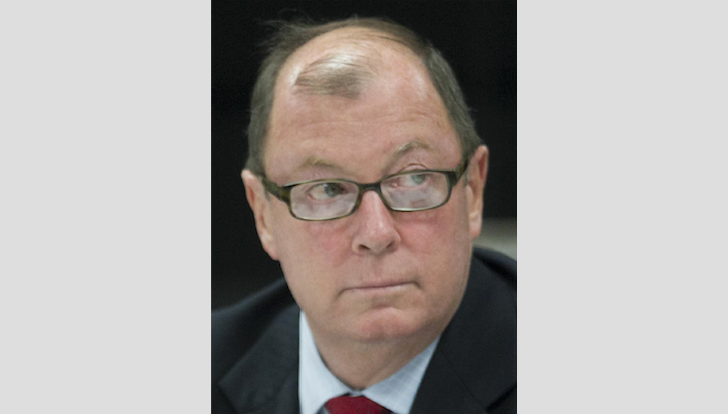Pulaski County Judge Barry Hyde is seeking to take over the county's juvenile probation programs, currently overseen by three Circuit Court juvenile judges, all who oppose the change.
The county chief executive's plan is included in a draft bill, tentatively sponsored by Sen. Will Bond, D-Little Rock. The two-page proposal applies to counties with populations exceeding 300,000, leaving only Pulaski County.
The legislative proposal was created in response to a pair of 2017 reports that found the county's juvenile probation system needed an overhaul, mostly due to poor organizational structure and management, not enough data-keeping and outdated training materials, Hyde said.
"I want the best juvenile probation service provided anywhere in the state," he added. "That's my goal and that's my job."
Juvenile probation comes into play after a child commits an offense and enters a guilty plea or is found guilty in court. Sometimes, a judge will order the child to go through months of probation instead of serving jail time. Probation is also used after a child gets out of a youth prison.
All three Pulaski County circuit judges who oversee juvenile cases said they were surprised by Hyde's plan when they learned of it two weeks ago and don't think probation management should change right now.
Circuit Judge Joyce Warren cautioned against the proposal because "there are so many issues that must be addressed when undertaking any reform -- including juvenile justice reform."
"There may be benefits from probation and intake officers being supervised by a person or agency other than circuit judges," Warren said, but "any move in that direction needs to be done in a reasoned, objective, and deliberate manner -- with input from persons who are currently involved and from those who would be affected."
Warren has decades of experience working with at-risk kids. She also leads the county's committee on the Juvenile Detention Alternatives Initiative, an effort introduced in the 1990s by the Annie E. Casey Foundation, a national child advocacy organization.
Judge Wiley Branton Jr. said he didn't get a chance to see the proposed bill until last Wednesday and doesn't support the idea "unless it was with the consent of the juvenile judges who now have that responsibility."
Judge Patti James, who also oversees juvenile cases, said she agreed with Branton.
Bond didn't immediately respond to the Arkansas Democrat-Gazette's requests for comment.
Arkansas law gives circuit judges authority to oversee juvenile probation officers or have probation services contracted out to a community-based provider.
However, state statutes also outline county judges' role as custodians of public buildings and county property and leaders of quorum court, which is composed of elected members who assist the county judge to levy county taxes and set aside funds for county expenses.
Current Pulaski County policy, allowed by state law, prevents county judges from attending juvenile court proceedings, which are closed to the public.
"Circuit judges should maintain juvenile probation," Branton said. "After all, the probation officers are carrying out the orders of circuit judges."
2017 STUDIES
Hyde says Pulaski County "can't move the ball forward ... on juvenile justice reform" until officials address structural problems in the juvenile probation program.
The county judge hopes to begin transitioning the juvenile probation system to his office this year and have the program running as its own department within county government by January 2020.
Changes would come from input made by a small advisory group that would include at least one juvenile court judge and from "best practices" used in certain parts of Arkansas, such as Benton County, where officials reported successes in lowering juvenile probation caseloads, as well as other states, he said.
Hyde also plans to hire a director to oversee the proposed new department, someone with experience in the juvenile justice field.
Hyde points to two 2017 reports that examined the county's juvenile probation system and found that officials could readily improve the management of probation officers, shorten probation lengths and streamline how probation cases are assigned.
One study by the Boston-based Robert F. Kennedy National Resource Center for Juvenile Justice recommended that Pulaski County update probation workers' job duties and descriptions, for instance. Without a current manual or mission statement to guide practices, workers don't know what was expected of them, the report found.
"The staff is clearly frustrated and demoralized, but anxious about the possibility that potential change will be worse than the status quo," the study read. "While everyone acknowledged there was a problem, no one was willing to discuss details or methods for resolution."
Pulaski County youths often spend too much time in juvenile probation, asserted a separate report, released by the Center for Children's Law and Policy out of Washington, D.C.
Probation lengths lacked consistency, the report explained, with some kids being placed on probation for a few months while other kids' terms stretched longer than a year.
"Stakeholders noted that especially long periods of probation with no clear end may lead youth and family members to feel a sense of hopelessness," the report said. "Lengthy probation terms are almost certain to lead to additional or deeper involvement with the justice system for technical violations."
In 2016, 54 percent of Pulaski County juvenile jail admissions were for probation violations, according to county data -- "a percentage that is among the highest that we have seen," the report stated.
Center for Children's Law and Policy researchers also found fault in how kids were randomly assigned to juvenile judges, each who have their own dedicated probation staff.
Children re-entering the system for committing an additional offense at a later time are still randomly assigned to a judge, leading to "inefficiencies and duplication of work ... as probation officers have to re-do interviews with youth and families to obtain information that had already been collected," the report said.
The study also called out Pulaski County for not adopting formal plans to implement recommendations issued in the RFK resource center's report.
Last March, an Arkansas Democrat-Gazette investigation found that many children placed in juvenile probation went without needed help because of overworked officers and circuit judges who didn't change the way they handled cases. Too often, probation was used to discipline, rather than rehabilitate, young offenders, the newspaper found, going against what national research indicates works best.
Branton said that he and the other Pulaski County circuit judges view "juvenile justice reform as an ongoing process," including juvenile probation. He regularly participates in the county's Juvenile Detentions Alternatives Initiative, led by Warren.
Both Warren and Branton use risk assessments -- screening tools that prevent needlessly punishing low-risk kids -- before each assigned youth is adjudicated, for instance. Child welfare advocates say risk assessment results give judges more information about individual children and allow them to use their discretion to divert kids from court proceedings, lowering probation officers' caseloads.
Pulaski County consistently sends fewer kids to youth prisons than it had in previous years, due to a "concerted effort" he and other judges have made, Branton said.
In 2006, Pulaski County circuit judges committed 178 kids to the Division of Youth Services, where they served sentences at a long-term juvenile lockup, state records show. In 2010, that figure dropped to 77; last year, 34 youths were committed.
"We've always been cooperative about participating in studies that look at our juvenile systems, even if that means opening ourselves to scrutiny," he said. "We're trying to implement changes in several areas. We just do them at our own speed."
A Section on 02/05/2019


